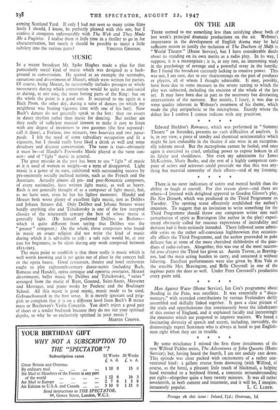MUSIC
IN a recent broadcast Mr. Spike Hughes made a plea for that particularly social kind of music which was designed as a back- ground to conversation. He quoted as an example the serenades, cessations and divertimenti of Mozart, which were written for parties. Of course, being Mozart, he occasionally includes passages or whole movements during which conversation would be quite as anti-social as during, at any rate, the more boring parts of the Ring : but on the whole the point is a good one. It occurred to me again at a Bach Prom. the other day, during a suite of dances (to which my neighbour was beating vigorous time with one of his feet). Now Bach's dances do not generally speak to the feet : they are essays in dance rhythm rather than music for dancing. But neither are they really of sufficient musical interest to make it easy to listen with any degree of intentness to two gavottes (the first repeated: call it three), a Forlane, two minuets, two bourrees and two passe- pieds. I felt the need of some subsidiary occupation and lit a cigarette, but I should really have liked a drink as well and some desultory and discreet conversation. The same is true—obviously it must be—of Handel's Fireworks Music played at the same con- cert: and of " light " music in general.
The great mistake in the past has been to use " light " of music as it is used of women ox weight—as a term of disapproval. Light music is a genre of its own, cultivated with outstanding success by pre-eminently socially inclined nations, such as the French and the Austrians. Actually almost all pre- and post-Romantic composers, of every nationality, have written light music, as well as heavy. Bach is not generally thought of as a composer of light music, but, as we have seen, even he has his lighter moments. Handel and Mozart both wrote plenty of excellent light music, just as Delibes and Johann Strauss did. Only Delibes and Johann Strauss wrote hardly anything else and Tchaikovsky is one of the few accepted classics of the nineteenth century the best of whose rnuSic is generally light. (He himself preferred Delibes to Brahms- which is quite different from saying that Delibes was the " greater " composer.) On the whole, those composers who found in music an ersatz religion did not write the kind of music during which it is advisable to talk : a safe rule would be, at any rate for beginners, to be silent during .any work composed between 1815-1915. The main point to establish is that there really is music which is well worth knowing and is yet quite out of place in the concert hall or the opera house. Good restaurant, theatre and hotel orchestras ought to play eighteenth-century dance-suites (including Bach, Rameau and Handel), opera comique and operetta overtures, Mozart divertimenti, ballet music by Delibes and Tchaikovsky, " suites " arranged from the music of Bizet, Gounod, Saint-Saens, Massenet and Messager, and piano works by Poulenc and the Boulanger School. All this music is good music, music made to be used, Gebrauchsmusik in the best sense. It is merely ignorant and prig- gish to complain that it is on a different level from Bach's B minor mass or Beethoven's Violin Concerto. You don't reject a good pair of shoes or a tender beefsteak because they do not stir your spiritual depths, so why be so exclusively spiritual in your music ?
MARTIN COOPER.


































 Previous page
Previous page